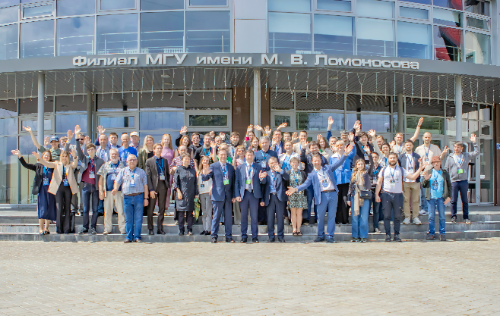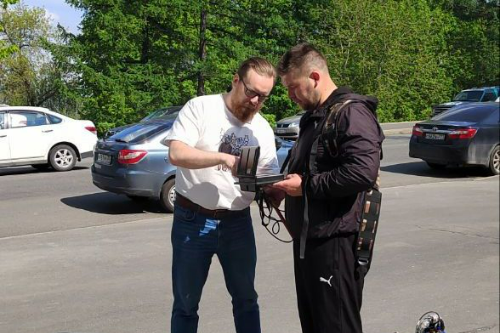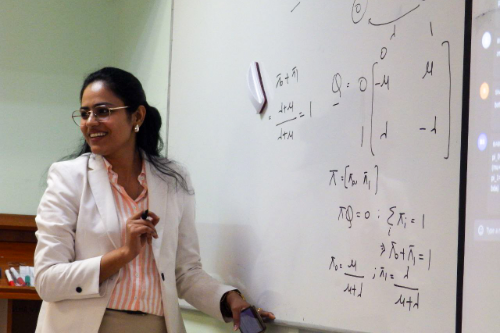On March 23-24 St. Petersburg hosted the Baltic Sea Days. The agenda of the first day included a meeting of the Russian National Sub-committee (RNSC) of the Interreg Baltic Sea Region Programme, in which President of the Karelian Research Centre RAS Olga Bakhmet is a permanent member.
One of the most noticeable projects in this programme is the “Baltic Sea Underground Innovation Network” (BSUIN, 2018-2020). Its implementation site in Karelia was the Ruskeala Mining Park. KarRC RAS was a project partner. As a result, the conditions were created for setting up an underground laboratory, geophysical monitoring and identification of dangerous jointing zones were carried out, marble and mineral impurities were sampled, the requirements for making tourist routes safe and accessible were determined, and the pre-investment plan for the development of the park was prepared.
This work will continue as integrated geo-ecological monitoring covering issues of geodynamics, geophysics, ecosystems in various habitats. Other plans for 2021 include opening of the Curly birch alley and the Mining Park Museum in Ruskeala.
This year, a new project “European Underground Laboratories” (EUL, 2021) was launched, within which KarRC RAS and Ruskeala will take part in the activities of the newly founded European Underground Laboratories Association.
“SEMPRE Accelerators for Service Co-creation” is another Interreg project in which Karelian Research Centre RAS is a partner. The project focuses on the empowerment of socially challenged groups through their involvement in the development of new social services, and on the creation of social start-ups and enterprises.
Implementing the forestry practices that reduce the input of nutrients and hazardous substances to regional and coastal waters is the objective of the project “Water management in Baltic forests – Tool Box” (WAMBAF-Tool Box). KarRC RAS participates in its Blue Targeting work package: last year, researchers tested in Karelia a technique for assessing the condition of small forest rivers designed by European specialists.
The RNSC meeting discussed the priorities and objectives of the Interreg Baltic Sea Region Programme for the new 2021-2027 phase: resilient and innovative economies and communities; water-smart societies; climate-neutral solutions, products and materials; smart green mobility, etc. The proposals submitted by the Karelian Research Centre in 2019 were taken into account when developing the priorities.
A wide discussion of the programme is scheduled for October, as part of the next international Strategic Planning Leaders Forum 2020-2021. KarRC RAS representatives have already been invited to participate.
International
News

March 30, 2021
At a meeting in St. Petersburg, KarRC RAS President Olga Bakhmet presented the organization’s results and plans for the Interreg Baltic Sea Region Programme, including setting up of an underground lab in Ruskeala, testing of sustainable water management tools, activities for and with socially challenged groups, and many other things.
See also:

September 19, 2025
Researchers from BRICS+ countries network to study human-altered ecosystems
Studies of human-altered ecosystems were the key theme of the international webinar organized by the Karelian Research Centre RAS for scientists from Russia, India, China, and Belarus. Researchers shared expertise on the application of modern approaches and the results of their work, and agreed to create an expert network for further interactions.
Studies of human-altered ecosystems were the key theme of the international webinar organized by the Karelian Research Centre RAS for scientists from Russia, India, China, and Belarus. Researchers shared expertise on the application of modern approaches and the results of their work, and agreed to create an expert network for further interactions.

July 10, 2025
International School “Interaction of Hydrogen Isotopes with Structural Materials” was held at the National Center for Physics and Mathematics in Sarov, Novgorod Region. Karelian scientists gave a lecture and presentations on computational materials science – an efficient tool for rescaling test-sample experimental data to real-life power reactor structures.

June 6, 2025
Study trip to KarRC RAS helps specialist from Vitebsk master new electrical resistivity imaging techniques, with applications in construction
Cooperation of Karelian Research Center RAS with Vitebsk State University continues. On June 5, the University's Master's student Dmitry Lysov completed his practical training course. The construction industry specialist studied the geophysical methods used by researchers at KarRC RAS.
Cooperation of Karelian Research Center RAS with Vitebsk State University continues. On June 5, the University's Master's student Dmitry Lysov completed his practical training course. The construction industry specialist studied the geophysical methods used by researchers at KarRC RAS.

June 5, 2025
Scientists from India and Russia lecture on mathematical modeling of communication systems at IAMR KarRC RAS
Institute of Applied Mathematical Research KarRC RAS is hosting a set of lectures of stochastic modeling of telecommunication systems. Scholars from the Indian Institute of Technology Delhi (IIT-Delhi) are appearing before young scientists from Russia and India as invited professors.
Institute of Applied Mathematical Research KarRC RAS is hosting a set of lectures of stochastic modeling of telecommunication systems. Scholars from the Indian Institute of Technology Delhi (IIT-Delhi) are appearing before young scientists from Russia and India as invited professors.


